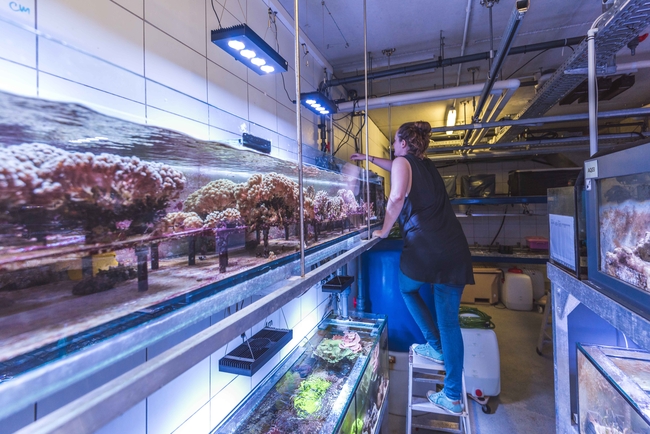
Animal experiments are used for some research projects at the ZMT. In its animal experimental research, the institute is committed to the principles of animal protection as laid down by law. This includes respect and careful, gentle handling of animals.
ZMT is a member of the "Transparent Animal Experiments" initiative of the German Alliance of Science Organisations, which was launched in summer 2021 by the "Understanding Animal Experiments" initiative and the DFG's Senate Commission on Animal Experiments. The aim is to promote transparency and open discussion on research involving animals.
With what goal do we conduct research on animals?
In accordance with its mission, the ZMT conducts research for the protection and conservation of marine and coastal ecosystems of the tropics. Effective protection of these habitats and their animal species is only possible if the animals' way of life and adaptive capacities are known and if one can assess the effect of environmental conditions, human influences and also protective measures on these animals.
At the ZMT, animal studies are used to address research questions related to climate change, environmental pollution, ecosystem changes due to resource use, sustainable aquaculture (IMTA), and novel marine diets.
What animal groups do we conduct research on?
These include various fish species, such as the Lusitanian toadfish (Halobatracus didactylus), the blue-striped snapper (Lutjanus kasmira) and the jewel rockhopper (Salarias fasciatus), as well as decapod species such as the mangrove crab (Uca tangeri).
Where are the laboratory animals kept?
An important factor for the welfare of the animals is their appropriate housing in modern animal facilities. The requirements for animal husbandry are specified in the relevant European Directive (EU 2010/63) for each animal species and are binding for legislation in the member states of the European Union.
The ZMT operates a seawater experimental facility where tropical organisms can be kept under species-appropriate conditions throughout the year. The tropical plants and animals are housed in holding and experimental systems of various sizes (10 litre aquarium to 3000 litre holding system). The enclosures are regularly inspected by the responsible authority of the state of Bremen.
How are the experimental animals kept?
For optimal husbandry we use artificial or natural seawater, temper air and water and create currents. The animals are fed with frozen, live or pellet food adapted to the respective organism. In addition, the behaviour of the animals is included in the housing conditions. For example, hiding places are offered and the socialization of organisms is made possible. The conditions in the experimental tanks are also optimally adapted to the respective organism.
The daily examination of all organisms is carried out by trained personnel with many years of experience, so that conspicuous animals can be immediately identified, isolated and, if necessary, treated. For treatment of diseased fishes we are in direct contact with the University of Veterinary Medicine Hannover.
Ethical framework
Animal experiments at the ZMT are conducted according to the 3Rs principle, which provides the ethical framework for planning and conducting research involving animal experiments and is also the basis of the German Animal Protection Act:
Whenever possible, alternative methods that do not involve animal experiments are used (replacement), the number of animals used is minimized if no alternative methods are available (reduction), and state-of-the-art methods are used and, if necessary, further developed to reduce harm and suffering to animals in scientific procedures (refinement).
These measures are under constant review and are also the subject of applications for projects including animal experiments. They may only be carried out if they have been approved by the competent state authority.
Numbers

Animal Welfare Officer and Animal Welfare Committee
Every public and private institution in Germany where researchers conduct animal experiments is required by law to appoint an animal welfare officer and an animal welfare committee. The ZMT has also appointed an animal welfare officer and an animal welfare committee to assist in animal welfare issues.
The Animal Welfare Officer advises the scientists in all matters concerning animal welfare. The person is involved in the planning of the animal experimental studies and has a controlling function in the execution of the experiments and the keeping of the animals. In addition, he/she is the contact person for official inquiries. The Animal Welfare Officer is supported by the animal welfare committee. At the ZMT, the Animal Welfare Officer himself/herself and three scientific and technical staff members from the field of animal experimental research are members of the Animal Welfare Committee.
Do you have any questions? Please feel free to contact us:





